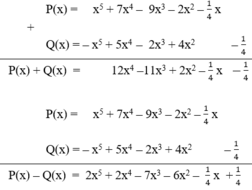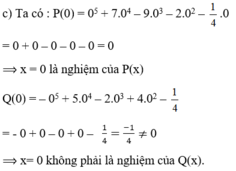
Hãy nhập câu hỏi của bạn vào đây, nếu là tài khoản VIP, bạn sẽ được ưu tiên trả lời.


Ta đặt và thực hiện các phép tính P(x) + Q(x) và P(x) – Q(x).



\(\cdot\) `\text {dnammv}`
`7,`
`a,`
`M(x)=\(-5x^4+3x^5+x\left(x^2+5\right)+14x^4-6x^5-x^3+x-1\)
`M(x)=-5x^4+3x^5+x^3+5x+14x^4-6x^5-x^3+x-1`
`=(3x^5-6x^5)+(-5x^4+14x^4)+(x^3-x^3)+(5x+x)-1`
`=-3x^5+9x^4+6x-1`
`N(x)=x^4(x - 5) - 3x^3 + 3x + 2x^5 - 4x^4 + 3x^3 - 5`
`= x^5-5x^4-3x^3+3x+2x^5-4x^4+3x^3-5`
`= 3x^5-9x^4+3x-5`
`b,`
`H(x)= N(x)+ M(x)`
`-> H(x)=(-3x^5+9x^4+6x-1)+(3x^5-9x^4+3x-5)`
`= -3x^5+9x^4+6x-1+3x^5-9x^4+3x-5`
`= (-3x^5+3x^5)+(9x^4-9x^4)+(6x+3x)+(-1-5)`
`= 9x-6`
`G(x)=M(x)-N(x)`
`-> G(x)= (-3x^5+9x^4+6x-1)-(3x^5-9x^4+3x-5)`
`= -3x^5+9x^4+6x-1-3x^5+9x^4-3x+5`
`= (-3x^5-3x^5)+(9x^4+9x^4)+(6x-3x)+(-1+5)`
`= -6x^5+18x^4+3x+4`
`c,`
`H(x)=9x-6`
Hệ số cao nhất: `9`
Hệ số tự do: `-6`
`G(x)= -6x^5+18x^4+3x+4`
Hệ số cao nhất: `-6`
Hệ số tự do: `4`
`d,`
`H(1)=9*1-6=9-6=3`
`H(-1)=9*(-1)-6=-9-6=-15`
`G(1)=-6*1^5+18*1^4+3*1+4=-6+18+3+4=12+3+4=15+4=19`
`G(0)=-6*0^5+18*0^4+3*0+4=0+0+0+4=4`
`H(x)=9x-6=0`
`-> 9x=0+6`
`-> 9x=6`
`-> x= 6 \div 9`
`-> x=`\(\dfrac{2}{3}\)
Vậy, nghiệm của đa thức là `x=`\(\dfrac{2}{3}\)

a) Sắp xếp theo lũy thừa giảm dần
P(x)=x^5−3x^2+7x^4−9x^3+x^2−1/4x
=x^5+7x^4−9x^3−3x^2+x^2−1/4x
=x^5+7x^4−9x^3−2x^2−1/4x
Q(x)=5x^4−x^5+x^2−2x^3+3x^2−1/4
=−x^5+5x^4−2x^3+x^2+3x^2−1/4
=−x^5+5x^4−2x^3+4x^2−1/4
b)
P(x)+Q(x)
=(x^5+7x^4−9x^3−2x^2−1/4^x)+(−x^5+5x^4−2x^3+4x^2−1/4)
=x^5+7x^4−9x^3−2x^2−1/4x−x^5+5x^4−2x^3+4x^2−1/4
=(x^5−x^5)+(7x^4+5x^4)+(−9x^3−2x^3)+(−2x^2+4x^2)−1/4x−1/4
=12x^4−11x^3+2x^2−1/4x−1/4
P(x)−Q(x)
=(x^5+7x^4−9x^3−2x^2−1/4x)−(−x^5+5x^4−2x^3+4x^2−1/4)
=x^5+7x^4−9x^3−2x^2−1/4x+x^5−5x^4+2x^3−4x^2+1/4
=(x^5+x^5)+(7x^4−5x^4)+(−9x^3+2x^3)+(−2x^2−4x^2)−1/4x+1/4
=2x5+2x4−7x3−6x2−1/4x−1/4
c) Ta có
P(0)=0^5+7.0^4−9.0^3−2.0^2−1/4.0
⇒x=0là nghiệm của P(x).
Q(0)=−0^5+5.0^4−2.0^3+4.0^2−1/4=−1/4≠0
⇒x=0không phải là nghiệm của Q(x).
Cho 2 đa thức: f(x)= 9 - x5 + 4x - 2x3 + x2 - 7x4
g(x)= x5 - 9 + 2x2 + 7x4 + 2x3 - 3x
a) Sắp sếp các đa thức trên theo luỹ thừa giảm dần của biến
f(x)= 9 - x5 + 4x - 2x3 + x2 - 7x4
f(x) = -x5 - 7x4 - 2x3 + x2 + 4x + 9
g(x)= x5 - 9 + 2x2 + 7x4 + 2x3 - 3x
g(x) = x5 + 7x4 + 2x3 + 2x2 - 3x - 9
b) Tìm bậc, hệ số cao nhất, hệ số tự do của đa thức f(x); g(x)
f(x) = -x5 - 7x4 - 2x3 + x2 + 4x + 9
+ Bậc : 5 _ hệ số cao nhất : -1 _ hệ số tự do : 9
g(x) = x5 + 7x4 + 2x3 + 2x2 - 3x - 9
+ Bậc : 5_ hệ số cao nhất : 1 _ hệ số tự do : -9
c) Tính f(x) + g(x); f(x) - g(x)
f( x) + g(x) = ( -x5 - 7x4 - 2x3 + x2 + 4x + 9 ) +( x5 + 7x4 + 2x3 + 2x2 - 3x - 9 )
= -x5 - 7x4 - 2x3 + x2 + 4x + 9 + x5 + 7x4 + 2x3 + 2x2 - 3x - 9
= ( -x5 + x5 ) + ( -7x4 + 7x4 ) + ( -2x3 + 2x3 ) + ( x2 + 2x2 ) + ( 4x -3x ) + ( 9 - 9 )
= 3x2 + x
f( x) - g(x) = ( -x5 - 7x4 - 2x3 + x2 + 4x + 9 ) - ( x5 + 7x4 + 2x3 + 2x2 - 3x - 9 )
= -x5 - 7x4 - 2x3 + x2 + 4x + 9 - x5 - 7x4 - 2x3 - 2x2 + 3x + 9
= ( -x5 - x5 ) + ( -7x4 - 7x4 ) + ( -2x3 - 2x3 ) + ( x2 - 2x2 ) + ( 4x + 3x ) + ( 9 + 9 )
= -2x5 - 14x4 - 2x3 -x2 + 7x + 18

b)
Sửa đề: f(x)=A(x)+B(x)
Ta có: f(x)=A(x)+B(x)
\(=x^5+7x^4-9x^3-2x^2-\dfrac{1}{4}x-x^5+5x^4-2x^3+4x^2-\dfrac{1}{4}\)
\(=12x^4-11x^3+2x^2-\dfrac{1}{4}x-\dfrac{1}{4}\)
a) Ta có: \(A\left(x\right)=x^5-3x^2+7x^4-9x^3+x^2-\dfrac{1}{4}x\)
\(=x^5+7x^4-9x^3+\left(-3x^2+x^2\right)-\dfrac{1}{4}x\)
\(=x^5+7x^4-9x^3-2x^2-\dfrac{1}{4}x\)
Ta có: \(B\left(x\right)=5x^4-x^5+x^2-2x^3+3x^2-\dfrac{1}{4}\)
\(=-x^5+5x^4-2x^3+\left(x^2+3x^2\right)-\dfrac{1}{4}\)
\(=-x^5+5x^4-2x^3+4x^2-\dfrac{1}{4}\)

a: \(F\left(x\right)=x^5-3x^2+x^3-x^2-2x+5\)
\(=x^5+x^3-4x^2-2x+5\)
\(G\left(x\right)=x^5-x^4+x^2-3x+x^2+1\)
\(=x^5-x^4+2x^2-3x+1\)
b: Ta có: \(H\left(x\right)=F\left(x\right)+G\left(x\right)\)
\(=x^5+x^3-4x^2-2x+5+x^5-x^4+2x^2-3x+1\)
\(=2x^5-x^4+x^3-2x^2-5x+6\)

x5 – 3x2 + x4 - 1/2 x – x5 + 5x4 + x2 – 1
= (x5 – x5) + (-3x2 + x2) + (x4 + 5x4) – 1/2.x – 1
= -2x2 + 6x4 - 1/2 x – 1
Sắp xếp: 6x4 – 2x2 - 1/2 x - 1

Mình xp giúp được mỗi câu đầu thôi nha ;-;;;; 2 câu sau mình chưa học, bạn thông cảm ;-;;;.
`a,` \(\text{P(x) =}\)\(2x^3-3x+x^5-4x^3+4x-x^5+x^2-2\)
`P(x)= (2x^3 - 4x^3)-(3x-4x) +(x^5-x^5) +x^2-2`
`P(x)= -2x^3- (-x)+0+x^2-2`
`P(x)=-2x^3+x+x^2-2`
`Q(x)= x^3-x^2+3x+1+3x^2`
`Q(x)= x^3- (x^2-3x^2) +3x+1`
`Q(x)=x^3- (-2x^2)+3x+1`

`@`\(P\left(x\right)=3x^5-5x^2+x^4-2x-x^5+3x^4-x^2+x+1\)
\(P\left(x\right)=\left(3x^5-x^5\right)+x^4+\left(-5x^2-x^2\right)+\left(-2x+x\right)+1\)
\(P\left(x\right)=2x^5+x^4-6x^2-x+1\)
`@`\(Q\left(x\right)=-5-3x^5-2x+3x^2-x^5+2x-3x^3-3x^4\)
\(Q\left(x\right)=\left(-3x^5-x^5\right)-3x^4-3x^3+3x^2+\left(2x-2x\right)-5\)
\(Q\left(x\right)=-4x^5-3x^4-3x^3+3x^2-5\)
`@`\(P\left(x\right)+Q\left(x\right)=\left(2x^5+x^4-6x^2-x+1\right)+\left(-4x^5-3x^4-3x^3+3x^2-5\right)\)
\(=-2x^5-2x^4-3x^3-3x^2-x-4\)
